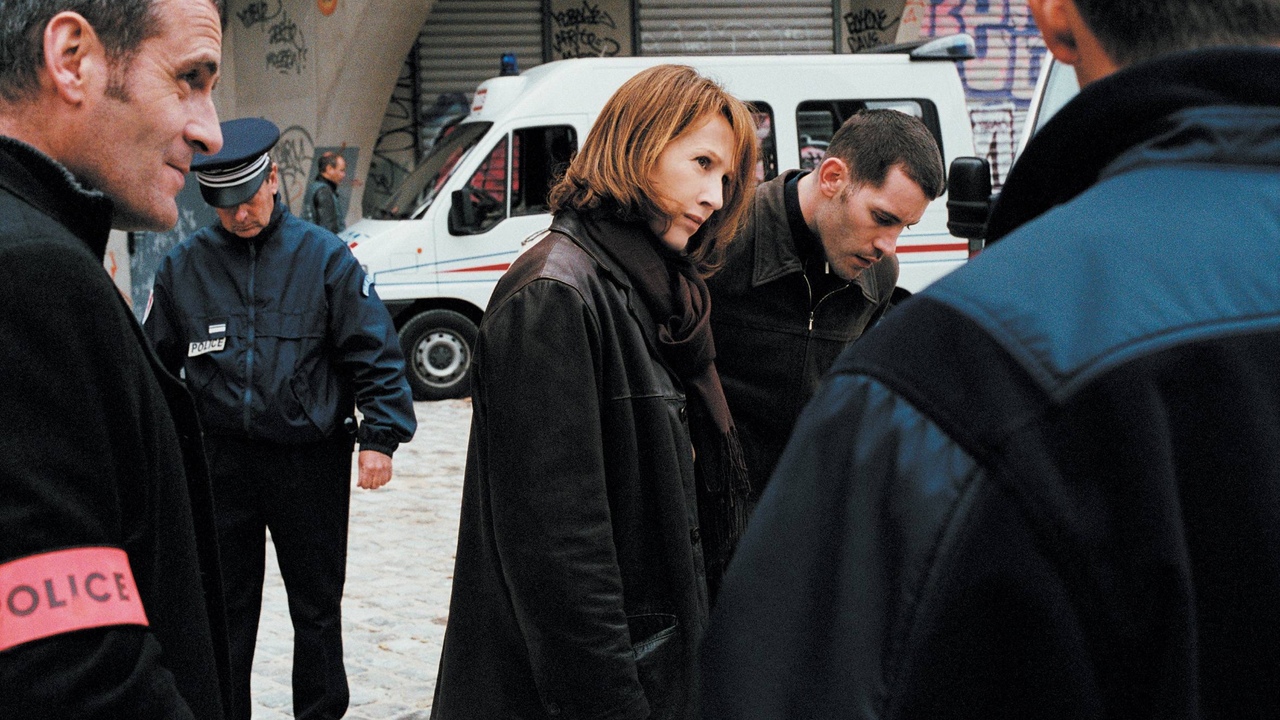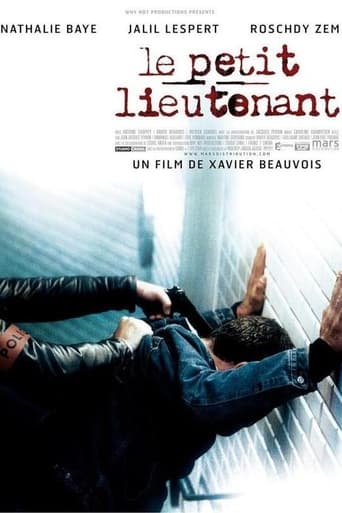stensson
This is the procedure school. It starts as a rather hectic story about the young policeman starting his job in a hectic Paris and ends in a classic British murder case, as it's seen in many many TV productions from BBC.But the Parisian police force is shown as real human beings this time, including alcohol problems, which is quite rare in French movies. The French attitude to alcohol has always been that there never can be any problems about it, because we're French. Anyway, after a while the movie is focused on the female Captain instead of the young copper. There's one main character in the beginning of the film and another at the end.Rather OK as police movie, but rather soon to be forgotten anyway.
Christian Heynk
The other day me and my friend cam out of the cinema. We had just seen VOLVER by Almodovar, and my friend made a very astute observation. She said: "In the beginning I had difficulties to get into this film. It is so uncommon to watch a film where there are so few cuts within the first ten minutes. Nowadays, when I go to the movies, I expect a car to be blown up or a man to be killed or an army to be set in motion within the first scenes". Le petit lieutenant had the same impact on me. Before seeing it, I thought: O.K., this is a cop film, a whodunit maybe, with a well conceived plot and lots of tension. Fortunately, I was mistaken. This film doesn't rush us into violent crime scenes and bold snide remarks by worn out and disillusioned cops. Instead it gives us an accurate account of everyday police work and it tells us how boring and dull police work can be. Due to these scenes of boredom the sequences where there is some real violence have a bigger impact on the viewer. Anyway, I just want to say, that I was completely thrilled by the realism of this film and I am staring to prefer European cinema to American cinema.
Chris Knipp
There's nothing very original about a rookie police officer from the provinces fresh out of police academy on his first assignment in Paris tackling a homicide case, yet director Xavier Beauvois; his star, the experienced Nathale Baye (who got a César for Best Actress for this role); and the other actors, some rookies, others veterans, have made something so fresh, exiting, and touching out of this material you almost feel as if nobody made a flic (cop) flick in France before – though of course such things are a longtime specialty there. Beauvois' Le Petit lieutenant simply shows that the French really know how to make movies. It doesn't matter how familiar the genre is, they can create something with texture and authenticity out of it.For me the rich feel Beauvois brings to his seemingly conventional material begins with the fact that there's no background music – it gives events on screen an unadorned quality – and with the way Beauvois, who's still in his thirties, puts his own basic experience into the story. Antoine (Jalil Lespert), the "petit lieutenant," the rookie, grew up in Normandy dreaming of being a cop in Paris where the great crimes are solved, he says – inspired by watching movies too. Beauvois grew up in Normandy himself, dreaming the same kind of dreams, watching movies, only the dreams were dreams of going to Paris where the great movies are made. Make the simple equation: Crimes+movies=crime movies and you've got a director who's making a parable about his own life.Caroline Vaudieu (Baye), the Inspector who chooses Antoine for her crime unit, is returning to work on the street again from a long period of the alcoholism that blighted both Beauvois' father's and his own life. Twelve-step recovery and addiction are felt and understood in the film. The AA meetings Caroline attends are in real AA meeting rooms with real alcoholics on screen. Caroline and Antoine are linked in ways that are felt, not contrived. She lost her son to meningitis nine years ago and Antoine's the age her son would be if he'd lived. Antoine's elementary school teacher wife has stayed in Normandy and now he has a room in Paris. He and Caroline share lonely lives; both are making a new start. And the casting is close to home in multiple ways: Beauvois, who also acts in the film as one of the crime team, Morbé, has cast Jalil's actor father Jean and brother Yaniss as his father and brother and his actress wife Bérangère Allaux as his wife.The opening scenes of Antoine's graduation from police academy and being embraced and congratulated by his family, and the elaborate procedure by which the assignments are handed out to the new graduates, are moments that in other hands might seem routine, but here they fairly bristle with authenticity. Such realism takes time to achieve. Eventually Le Petit lieutenant is going to become exciting, even hair-raising, but it doesn't have the BANG! BANG! opening sequences dear to US directors, nor are those openings about Antoine simply routine: they're the beginning of an extended portrait of Antoine and his new life in Paris. This movie is fundamentally humanistic and it doesn't hurry because we need to get to know Antoine and the team he works with, feel the boredom and routine that are big parts of any cop's life, acquaint ourselves with the details of their personalities.Somehow I don't think a rookie in an American cop movie would tell his dad that the extraction of a brain in his first witnessed autopsy made him think of Mozart and say "It's strange, I thought: 'Mozart was made of this too.'" There's no "need" for that moment; but it makes all the difference. It's of such moments that good movies are made.Antoine's on night duty at first and when his team goes out he's made to stay behind to man phones. He gets drunk to celebrate his initiation, which is good for camaraderie (and for the rounding out of Antoine's character) but hard for Inspector Vaudrieu, who must stand by drinking nothing but soda water. As the film, knowing about alcoholism, makes us aware, the alcoholic is only one drink away from relapse, and such times are hard for Caroline. She has to leave the bar and go home early. Later naively the rookie admits to her he used to smoke the occasional joint and surprisingly, she shares one with him. There are inevitable hints from the outside that they might have an affair, but given the feelings, that would be incest. What's clear is that though not much time has passed, they've become close.The first homicide is a homeless person in the Seine – petty stuff. But there are connections with another crime and the investigation turns serious. Eventually a failure of responsibility of one of the men leads to dire consequences. When the action really heats up, it's a shock that hits you in the stomach. The "dull, routine" establishing sequences have lulled you and made you forget that violence might be coming. They've also made you understand and care about the characters in an authentic-feeling way so that when somebody is at risk, you take it quite personally and the whole final section of the movie as its focus shifts more and more to Inspector Vaudrieu is tinged with overwhelming sadness.Nothing that happens in Le Petit lieutenant is out of the ordinary. What's exceptional is the way the screenplay is written to make you care. There's excitement, tension, violence. But it's brilliantly yet understatedly contextualized. The awareness communicated is that cops' frequently numbing work can also be thrilling, important – and heartbreaking. Hollywood sends that message out too, but too often in tired language. Because Beauvois' team clearly cared about their work they've been able to show us cops that do so too.(NYC March 2006.)
slabihoud
A young lieutenant, fresh from school, starts in Paris in a homicide squad. He grew up in Le Havre, where his wife still teaches at school. He misses her and tries to get her to move to Paris too. His boss is a very good police inspector, who just returns to the police after having dropped for personal reasons. She had lost her only son and became an alcoholic. Now she is clean and takes over a new group. Soon they have to investigate the murder of a homeless person. The search for the killer brings big dangers for most of the group, but specially for the lieutenant and his boss.The film shows some everyday routine of police work and how the officers enjoy themselves after their day is done. There are no big things going on, even the murder case is not very special. It is the personal situation of the two main characters that involves the interest of the audience. Well done, though not really great. 7 out of 10.

